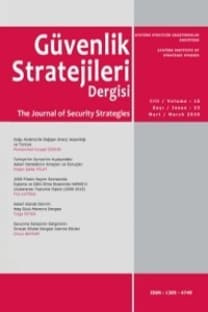Facilitating economic activity in conflict zones
Çatısma alanlarında ekonomik faaliyetleri arttırma
___
- Papers:
- BESLEY Tim, MUELLER Hannes and SINGH Prakarsh, “Conflict and investment”, 1. IGC Workshop on Fragile States, St. Anne’s College, Oxford (2011 July 6-7).
- BOUW Brenda, “The risky business of resources in conflict zones”, The Globe and Mail, 2011 July 12. “Business in conflict zones: India Inc and government have to pay”, The Economic Times, 2010 May 16.
- EVERS Tobias, “Doing business and making peace?” Occasional UIpapers, No: 3, 16. Utrikepolitiska Institutet (Swedish Institute of International Affairs), 2010 December 6.
- JORAS Ulrike, “Motivating and impeding factors for corporate engagement in peace-building”, Working paper, Swiss Peace Foundation, 2009 August.
- LEMMON Gayle Tzemach, “Entrepreneurship in post conflict zones”, Working paper, Council of Foreign Relations, 2012 May.
- MILLS Rob and FAN Qimiao, “The investment climate in postconflict situations”, Policy research working papers, World Bank, 2006 November.
- ROSS Michael L., “Oil drug and barons: the varying role of natural resources in violent conflict”, in Karen Ballantine and Jake Sherman (eds). The Political Economy of Armed Conflict: Beyond Greed and Grievance. Lynne Reinner Publishers, London, 2003.
- SAMSET Ingrid, (n.d.) “Natural resource wealth, conflict, and peacebuilding”, Ralph Bunche Institute for International Studies, City University of New York.
- SARWARY Abdullah, (n.d.) “Opportunities for Economic Growth in Afghanistan”, Centre for Conflict and Peace Studies Afghanistan.
- Internet: “Africa: informal sector is a critical economic vessel, says report. (2011 November 9). All Africa. Retrieved from http://allafrica.com/ stories/201111091470.html (Access date: 17.09.2012). African Development Bank Group, web site: www.afdb.org/en/ (Access date: 24.09.2012).
- ALLURI Rina M., “The role of tourism in post-conflict peace-building in Rwanda”, Swiss Peace Foundation, 2009 December. Retrieved from http://www.isn.ethz.ch/isn/Digital-Library/Publications/Detail/ ?ots591=0c54e3b3-1e9c-be1e-2c24-a6a8c7060233&lng=en&id=1115 83 (Access date: 22.09.2012).
- Asian Development Bank, web site: www.adb.org (Access date: 24.09.2012).
- BENNETT Juliette, “Business in zones of conflict - the role of the multinationals in promoting regional stability”, UN global compact policy dialogues, 2001 January, Retrieved from http://www.unglobalcompact.org/issues/conflict_prevention/meetings_ and_workshops/Reg_stability.html (Access date: 17.09.2012).
- Business Edge (International Finance Cooperation), web site: http://www.businessedge-me.com/cms.php?id=about_be_what_is_ business_edge (Access date: 03.10.2012).
- Cherie Blair Foundation for Women, web site: http://www.cherieblair foundation.org/about-us (Access date: 03.10.2012).
- Compañía Española de Financiación del Desarrollo, COFIDES S.A., web site: http://www.cofides.es/english/Default.aspx (Access date: 01.10.2012).
- Detailed structure and explanatory notes, ISIC Rev.3.1, (International Standard Industrial Classification of All Economic Activities, Rev.3.1), United Nations Statistics Division, (n.d.). Retrieved from http://unstats.un.org/unsd/cr/registry/regcst.asp?Cl=17&Lg=1 (Access date: 17.09.2012).
- Deutsche Investitions- und Entwicklungsgesellschaft mbH (DEG), web site: http://www.deginvest.de/EN_Home/About_DEG/index.jsp (Access date: 27.09.2012).
- Fair trade soccer ball (n.d.), Global good partners. Retrieved from http://www.globalgoodspartners.org/cart/details.cfm?prodid=628. (Access date: 20.09.2012).
- “Guidance on responsible business in conflict-affected and high-risk areas: a resource for companies and investors”, United Nations global compact office, 2010. Retrieved from http://www.unglobal compact.org/docs/issues_doc/Peace_and_Business/Guidance_RB.pdf (Access date: 23.09.2012).
- Industry Center, Yahoo! Finance (n.d.). Retrieved from http://biz.yahoo.com/ic/ (Access date: 17.09.2012).
- “In Kabul a ‘dressmaker’ sows entrepreneurial seeds”, Morning edition, National public radio, 2011, March 11. Retrieved from http://www.npr.org/2011/03/15/134533995/in-kabul-a-dressmakersows- entrepreneurial-seeds (Access date: 20.09.2012).
- Inter-American Development Bank, web site: www.iadb.org (Access date: 24.09.2012).
- International Monetary Fund, web site: http://www.imf.org/external/ index.htm (Access date: 24.09.2012).
- International Finance Cooperation, web site: http://www1.ifc.org/ wps/wcm/connect/corp_ext_content/ifc_external_corporate_site/home (Access date: 24.09.2012).
- “ILO Department of Statistics - Short term indicators of the labour market”, International Labor Organization, Department of Statistics, (n.d.). Retrieved from http://laborsta.ilo.org/sti/sti_E.html (Access date: 17.09.2012).
- Islamic Development Bank, web site: www.isdb.org (Access date: 24.09.2012).
- IYER Lakshimi and SANTOS Indhira, “Creating jobs in South Asia's conflict zones”, Policy research working papers, World Bank, 2012 June. Retrieved from http://econ.worldbank.org/external/default/ main?pagePK=64165259&theSitePK=469372&piPK=64165421&men uPK=64166093&entityID=000158349_20120625094609 (Access date: 14.09.2012).
- KATAYAMA Lisa, “Investing in post-conflict zone startups just might save the world”, Fast Company, 2010, October 15. Retrieved from: http://www.fastcompany.com/1695121/investing-post-conflict-zonestartups- just-might-save-world (Access date: 12.09.2012).
- Mercy Corps, Economic Development, web site: http://www.mercy corps.org/topics/economicdevelopment (Access date: 02.10.2012).
- Mercy Corps, Micro Enterprise, web site: http://www.mercy corps.org/topics/microenterprise (Access date: 02.10.2012).
- NELSON Jane, “The business of peace: the private sector as a partner in conflict prevention and resolution”, International Alert, Council on Economic Priorities, The Prince of Wales Business Leaders Forum, 2000 January 1. Retrieved from http://www.internationalalert.org/ resources/publications/business-peace (Access date: 17.09.2012). Overseas Private Investment Cooperation, web site: http://www.opic.gov/ (Access date: 26.09.2012).
- ROBERTS Marta, (n.d.). “Working in a war zone”, Security Management. Retrieved from http://www.securitymanagement.com/ article/working-war-zone (Access date: 19.09.2012).
- “SEIIF-Oxfam and Symbiotics target investment industry with new SME fund”, Press Release, Oxfam Press Office and Symbiotics Group. 2012 January 12. Retrieved from http://www.symbiotics group.com/news/latest-news/seiif-oxfam-and-symbiotics-targetinvestment- industry-with-new-sme-fund (Access date: 03.10.2012).
- Task Force of Business and Stability Operations, web site: http://tfbso.defense.gov/www/index.aspx (Access date: 23.09.2012). The Bpeace Multiplier Effect, web site: http://www.bpeace.org/aboutus/ impact.html (Access date: 03.10.2012).
- “The DOTSI soccer ball story”, Bpeace Blog, 2010, November 26. Retrieved from http://blog.bpeace.org/?p=1371 (Access date: 21.09.2012).
- The World Bank Development Report 2011, World Bank. Retrieved from http://www.scribd.com/doc/56133164/World-Development- Report-2011 (Access date: 12.09.2012).
- “Unlocking the African Moment-Rural Infrastructure in Africa”DSM paper series, Development Support Monitor, 2012. Retrieved from http://www.africanmonitor.org/am_dsm.html (Access date: 17.09.2012).
- U.S. Department of Commerce, “Doing Business in Afghanistan: A Country Commercial Guide for U.S. Companies”, 2005.
- U.S. Department of Commerce, “Doing Business in Iraq: A Country Commercial Guide for U.S. Companies”, 2012.
- U.S. Agency for International Development, web site: http://www.usaid.gov/ (Access date: 25.09.2012).
- World Bank web site: http://www.worldbank.org/ (Access date: 24.09.2012).
- ISSN: 1305-4740
- Yayın Aralığı: 3
- Başlangıç: 2005
- Yayıncı: Millî Savunma Üniversitesi Atatürk Stratejik Araştırmalar ve Lisansüstü Eğitim Enstitüsü
Tocqueville'in Cezayir Raporlarında Doğa Yasaları ve Güvenlik
Tocqueville'in Cezayir Raporlarında Doğa Yasaları ve Güvenlik
Tek Avrupa Hava Sahası İnisiyatifinin Türkiye'nin AB Üyeliğine Etkisi
Ege Hava Sahası Sorunları, Çözülmüş Olanlar ve Sorunların Geleceği
Küresel ve Bölgesel Güçlükler Karşısında Pakistan'ın Demokratikleşme Çabaları
Tocqueville’in Cezayir raporlarında Doga yasaları ve güvenlik
